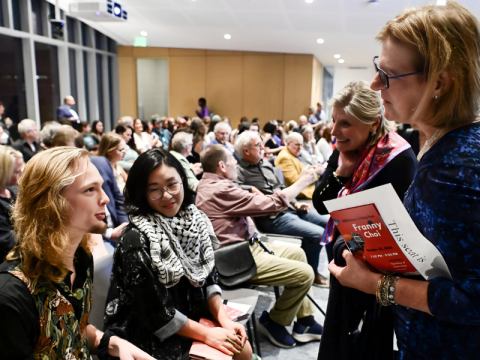Franny Choi's Workshop and Reading Spark Inspiration at Newcomb Institute’s Florie Gale Arons Poetry Program
January 17, 2024
Newcomb Institute was delighted and honored to host Franny Choi as the featured poet of the 2023 Florie Gale Arons Poetry Program. The program was established by the daughters of Florie Gale Arons (NC ’50) in 1999 in honor of their mother’s 70th birthday. Since then, Newcomb Institute has brought a distinguished poet to Tulane every year to expose students and the local community to inspirational poetry in an intimate setting.
Franny Choi is the author of three poetry collections: The World Keeps Ending, and the World Goes On (2022), Soft Science (2019), and Floating, Brilliant, Gone (2014). Choi’s writing has appeared in the New York Times, the Atlantic, the Paris Review, and elsewhere; they have also received several awards, including the Lily/Rosenberg Fellowship, Princeton’s Holmes National Poetry Prize, and the Elgin Award. They are faculty in Literature at Bennington College, the founder of Brew & Forge, and working on an essay collection about Asian robot women.
Throughout their residency, Choi visited classes, guided a creative writing workshop, and gave a public reading from The World Keeps Ending, and the World Goes On with a subsequent Q&A.
Laura Wolford, Associate Director and Director of Operations at Newcomb Institute says, “The poetry workshop is a unique aspect of the program, as it brings together poets from all ages in the New Orleans community—we have high school students from NOCCA and Willow, undergraduates from Tulane, MFA students from UNO, and poets from the community all learning together in the same space.” It’s one of the best community outreach programs the Institute hosts and is undoubtedly beloved. “For the people who attend, it’s great; they love it, they’re obsessed with it. Especially if you’re a younger student actively trying to be a poet, what an incredible opportunity: award-winning poets sitting down and saying ‘let me read your poetry’ or ‘let’s workshop this together,’” says Julie Qiu, who organizes the workshop.
Sawyer Liner (SSE ’24 & SLA’24) attended the workshop and commented that they found Choi’s advice helpful. “A lot of poetry is kind of sad and drab and looks at the world that exists right now, and Choi wanted to test us in our ability to imagine a world that is not this world and what that world can say about how we act here.” Liner applied this imagination to more than their writing; they said it has also changed their philosophies as an activist.
The workshop was an interactive, intimate, and fun setting of 13 participants, but the reading was open to the public. Qiu said it was “Incredibly well attended to the point where people were pulling in chairs from all the common spaces to come… it was students, people from the community; it was not just creative writing classes or English classes; it was a bunch of people from everywhere.” The engaging reading from Choi’s book, “The World Keeps Ending, and the World Goes On,” was enjoyable for poets and non-poets alike, but long-time Choi fans could enjoy a new perspective on the book. Liner commented that hearing a poet read the poem themselves can often reveal new rhythm and meaning to readers; after the reading, they returned to the book with “a whole new dimension of it to enjoy.”
Franny Choi’s visit focused on their newest book, which tackles relevant and significant topics. Qiu referenced “Asian representation and queer representation and… the relationship between technology and modern society” and stated that these relatable topics made the poetry easier to digest for any reader, rather than just English majors. Liner also felt that the book is pertinent today, stating, “They’re engaging with this modern moment as something rife with apocalypses…Her willingness to pursue the project of finding a way to deal with that immediately struck me as an immense project. A lot of times, it is pitched as ‘Everything will be fine’ or ‘The world is ending anyway, so why not do whatever we want?’ Franny Choi is able to engage with these perspectives and come to a new understanding of how we need to hope in the modern moment that I think was so much more profound than anything I’ve heard on the topic before.”
Liner pointed out that the Florie Gale Arons event is a “more accessible way” to discuss these heavy topics. “That’s one of the powers that poetry affords... it can open your eyes to new knowledge, and I think for Kiki Petrosino and Franny Choi to be able to share their perspectives does a lot for the people in the audience who maybe haven’t considered their own marginalization through similar lenses and come to terms with it through the same intellectual framework that these brilliant poets have spent years and years getting to.
Next year’s Arons poet has not been announced but is sure to be just as impactful and engaging as Choi’s visit. “Poetry is a vibrant part of how we make meaning of our lives and our place in the world—and having the opportunity to meet with contemporary poets who have a national profile is a real honor. If you are a creative writing student, these events are a great way to learn more about how you approach your writing. And suppose you’re not a creative writing student. In that case, I hope that you might be able to take a moment to step outside of your everyday work, pause for a moment, listen to something beautiful and moving, and have a moment of reflection that takes you out of yourself for a little bit,” says Wolford.

